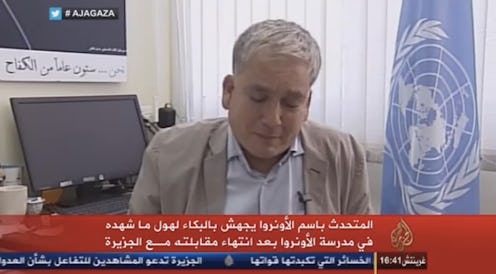News
UN Official Captures Gaza Heartbreak In Interview
Raw emotion is rarely as palpable on live television as it was during UN official Chris Gunness' heartbreaking interview with Al Jazeera Arabic. In a gut-wrenching display of grief, Gunness, the spokesman for the UN agency for Palestinian refugees (UNRWA), broke down while answering questions about the shelling of the UN-run Jabalia Elementary Girls School that served as a shelter for more than 3,000 Palestinians. The image of his bowed head, body wracked by sobs, has become indicative of the utter devastation the ongoing conflict has caused on both sides.
The bombing, according to Gaza's Ministry of Health, claimed at least 20 lives and wounded 90 more, and was the latest in a string of attacks that have now killed 1,418 Palestinians. "The rights of Palestinians," Gunness said, "And even their children, are wholesale denied... and it's appalling."
This was the sole sentence Gunness mustered in response to the attack before succumbing to tears — video of the interview shows another man embracing and attempting to comfort Gunness before cameras pan away.
While images of both Israeli and Palestinian casualties have been devastatingly powerful, Gunness' interview offers a rare glimpse into the effects the violence has had on those who have continued to bear witness to seemingly endless airstrikes, bombings, and raids.
His tears, Gunness later told The Guardian, were never meant to be seen by the public. The interviewer from Al-Jazeera had already thanked him and signed off, and Gunness, drained by the interview and overwhelmed by recent events, could no longer contain himself. He began to cry, completely unaware that he was still on camera. Said Gunness,
For me, it was a moment of private grief. I had no idea it had been broadcast until friends started calling and texting me.
But intentional or not, his emotional display has encapsulated the feelings of individuals around the world, both directly and indirectly involved in the conflict. In his personal devastation, he aroused public sentiment. Said Gunness, "If my tears focus attention on...Gaza, then I have no regrets."
The burgeoning death toll has met with international criticism, and for many, the attack on the school was the last straw. Jan Eliasson, the UN's deputy secretary general, told the New York Times, "This is a moment where you really have to say, ‘Enough is enough,’ and you have to search for the right words to convince those who have the power to stop this."
And it seems that for the time being, at least, Israel and Hamas are in agreement — enough is enough. On Thursday, the US and UN released a joint statement that announced a 72-hour "unconditional" humanitarian ceasefire would begin at 8 a.m. Gaza time on Friday.
This ceasefire will be the first time in 23 days that the tiny strip of land, double the size of Washington, D.C. and about triple the population, has seen relative peace. This period of rest is necessary to allow aid to reach the civilians who have been affected by the ongoing fighting, many of whom have lost family members, friends, and homes.
In their joint statement, the US and UN "urge[d] all parties to act with restraint until this ceasefire begins and fully abide by their commitments during the ceasefire," and also noted that it is of paramount importance to allow "innocent civilians much-needed reprieve from the violence."
Due to the violence, residents of Gaza have been unable to safely carry out even the most basic functions, "including burying the dead, taking care of the injured and restocking food supplies." While the ceasefire is only slated to last until Monday, there is a possibility that it might be extended.
And for many, like Chris Gunness, the hope is that this ceasefire will lead to a peace deal between Israel and Hamas. Gunness tweeted on Wednesday that many United Nation's facilities were at a "breaking point" and that their shelters were "overflowing."
According to UN reports, about 12 percent of Gaza's population, or 219,000 people, are vying for space in 86 shelters. CNN reports that clean water is essentially impossible to obtain, and the Palestinian Energy Natural Resources Authority in Gaza has issued statements that claim that there is no electricity to be had for hospitals, sewage treatment, or other day-to-day use.
Talks will continue during the three-day ceasefire, as the US-UN joint statement announced, "Israeli and Palestinian delegations will immediately be going to Cairo for negotiations...aimed at reaching a durable cease-fire." But for civilians affected on both sides of the conflict, Gunness' profound words to The Guardian ring true — "We have now reached a point of such profound tragedy that tears are more eloquent than words."
Getty Images (3)
